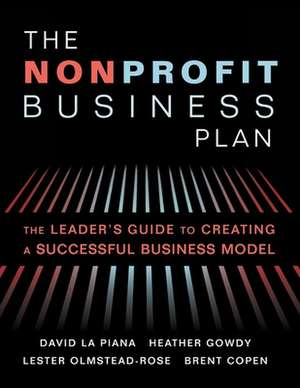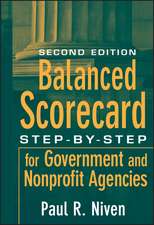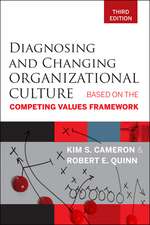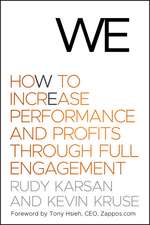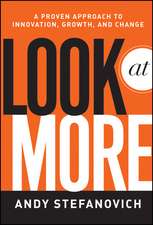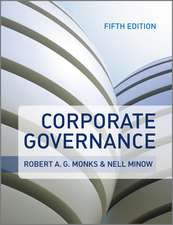The Nonprofit Business Plan: A Leader's Guide to Creating a Successful Business Model
Autor David Lapiana, Heather Gowdy, Lester Olmstead-Roseen Limba Engleză Paperback – 30 iun 2012
A fresh, compelling approach to establishing a sustainable, results-driven nonprofit business plan.
Nonprofits often use the terms “strategic planning” and “business planning” interchangeably, but a good business plan goes beyond the traditional strategic plan with its focus on mission and vision, goals and objectives. The Nonprofit Business Plan, created by the nationally recognized nonprofit consultant experts at La Piana Consulting, helps your nonprofit organization understand what a strategic business plan is and why you need one, then provides a practical, proven process for creating a successful, sustainable business model. This groundbreaking resource further explains how your nonprofit can determine whether a potential undertaking is economically viable—a vital tool in today’s economic climate—and how to understand and solve challenges as they arise.
With detailed instructions, worksheets, essential tools, case studies, and a rigorous financial analysis presented clearly and accessibly for executives, board members, and consultants, The Nonprofit Business Plan is also an important resource for non-specialist audiences such as potential funders and investors. This innovative step-by-step guide will provide your team with a solid set of business decisions so that your nonprofit can achieve maximum results for years to come.
Nonprofits often use the terms “strategic planning” and “business planning” interchangeably, but a good business plan goes beyond the traditional strategic plan with its focus on mission and vision, goals and objectives. The Nonprofit Business Plan, created by the nationally recognized nonprofit consultant experts at La Piana Consulting, helps your nonprofit organization understand what a strategic business plan is and why you need one, then provides a practical, proven process for creating a successful, sustainable business model. This groundbreaking resource further explains how your nonprofit can determine whether a potential undertaking is economically viable—a vital tool in today’s economic climate—and how to understand and solve challenges as they arise.
With detailed instructions, worksheets, essential tools, case studies, and a rigorous financial analysis presented clearly and accessibly for executives, board members, and consultants, The Nonprofit Business Plan is also an important resource for non-specialist audiences such as potential funders and investors. This innovative step-by-step guide will provide your team with a solid set of business decisions so that your nonprofit can achieve maximum results for years to come.
| Toate formatele și edițiile | Preț | Express |
|---|---|---|
| Paperback (1) | 212.68 lei 3-5 săpt. | |
| Fieldstone Alliance – 30 iun 2012 | 212.68 lei 3-5 săpt. | |
| Hardback (1) | 266.58 lei 3-5 săpt. | |
| Fieldstone Alliance – 30 iun 2012 | 266.58 lei 3-5 săpt. |
Preț: 212.68 lei
Nou
Puncte Express: 319
Preț estimativ în valută:
40.70€ • 42.60$ • 33.67£
40.70€ • 42.60$ • 33.67£
Carte disponibilă
Livrare economică 15-29 martie
Preluare comenzi: 021 569.72.76
Specificații
ISBN-13: 9781618580061
ISBN-10: 161858006X
Pagini: 176
Dimensiuni: 216 x 279 x 10 mm
Greutate: 0.42 kg
Editura: Fieldstone Alliance
ISBN-10: 161858006X
Pagini: 176
Dimensiuni: 216 x 279 x 10 mm
Greutate: 0.42 kg
Editura: Fieldstone Alliance
Cuprins
Table of Contents
Acknowledgments 4
Preface 5
How this Book is Organized 8
Chapter 1: What is a Nonprofit Business Plan and Why do You Need One? 10
Business Planning Defined 12
The Value of a Business Plan 15
Business Planning and Strategic Planning: the Essential Differences 17
The Right Plan for the Situation 24
Chapter 2: Getting Started 28
The Six Basic Business Planning Questions 31
Case Study: Knowledge Force ߝ Part 1 48
Chapter 3: Understanding and Assessing Your Business Model 58
Step 1: Examine Your Scope 60
Step 2: Assess your Economic Logic 63
Step 3: Evaluate Your Organizational Capacity 68
Case Study: Knowledge Force ߝ Part 2 70
Chapter 4: Developing Your Plan 73
Clarifying Strategic Intent 75
Market Research and Market Positioning 76
Case Study: Knowledge Force ߝ Part 3 83
Operations and Infrastructure 89
Case Study: Knowledge Force ߝ Part 4 94
Governance and Management 97
Case Study: Knowledge Force ߝ Part 5 100
Key Collaborative Relationships 102
Significant Partners 103
Case Study: Knowledge Force ߝ Part 6 104
Marketing Strategy 106
Case Study: Knowledge Force ߝ Part 7 107
Financial Projections and Fund Development 108
Monitoring, Evaluation and Measuring Impact 108
Risk and Risk Mitigation 110
Conclusion 115
Chapter 5: The Financial Dimension of Your Business Plan 116
Building Financial Projections 116
Three Important Financial Statements 117
Seven Steps to Building Financial Projections 119
Seven Do’s and Don’ts 142
Conclusion 143
Chapter 6: Pulling it All Together 144
Case Study: Knowledge Force ߝ Part 8 152
Business Plan as Roadmap 157
Chapter 7: Planning for Growth: Two Scenarios 159
Assessing the impact of a new program on an existing organization 160
Chapter 8: Business Plan as Decision-Making Tool 164
Engaging your key colleagues in the decision 165
Attracting funders to a winning idea 166
Acknowledging when a venture or an idea is unworkable 167
Conclusion: Go out and Make it Happen! 169
Appendix A Sample Business Plan: Knowledge Force 171
Appendix B Financial Projections Template 172
Glossary 180
Acknowledgments 4
Preface 5
How this Book is Organized 8
Chapter 1: What is a Nonprofit Business Plan and Why do You Need One? 10
Business Planning Defined 12
The Value of a Business Plan 15
Business Planning and Strategic Planning: the Essential Differences 17
The Right Plan for the Situation 24
Chapter 2: Getting Started 28
The Six Basic Business Planning Questions 31
Case Study: Knowledge Force ߝ Part 1 48
Chapter 3: Understanding and Assessing Your Business Model 58
Step 1: Examine Your Scope 60
Step 2: Assess your Economic Logic 63
Step 3: Evaluate Your Organizational Capacity 68
Case Study: Knowledge Force ߝ Part 2 70
Chapter 4: Developing Your Plan 73
Clarifying Strategic Intent 75
Market Research and Market Positioning 76
Case Study: Knowledge Force ߝ Part 3 83
Operations and Infrastructure 89
Case Study: Knowledge Force ߝ Part 4 94
Governance and Management 97
Case Study: Knowledge Force ߝ Part 5 100
Key Collaborative Relationships 102
Significant Partners 103
Case Study: Knowledge Force ߝ Part 6 104
Marketing Strategy 106
Case Study: Knowledge Force ߝ Part 7 107
Financial Projections and Fund Development 108
Monitoring, Evaluation and Measuring Impact 108
Risk and Risk Mitigation 110
Conclusion 115
Chapter 5: The Financial Dimension of Your Business Plan 116
Building Financial Projections 116
Three Important Financial Statements 117
Seven Steps to Building Financial Projections 119
Seven Do’s and Don’ts 142
Conclusion 143
Chapter 6: Pulling it All Together 144
Case Study: Knowledge Force ߝ Part 8 152
Business Plan as Roadmap 157
Chapter 7: Planning for Growth: Two Scenarios 159
Assessing the impact of a new program on an existing organization 160
Chapter 8: Business Plan as Decision-Making Tool 164
Engaging your key colleagues in the decision 165
Attracting funders to a winning idea 166
Acknowledging when a venture or an idea is unworkable 167
Conclusion: Go out and Make it Happen! 169
Appendix A Sample Business Plan: Knowledge Force 171
Appendix B Financial Projections Template 172
Glossary 180
Recenzii
“No matter who you are—nonprofit CEO, board member, business school professor, or student—you’ll come away with a real-world sense of what makes a strong strategic plan or business plan and when to use one or the other . . . or both in tandem.” —Lester Strong, Vice President of Experience Corps, AARP
“This new book is a very useful and timely complement to The Nonprofit Strategy Revolution. Having reaped the benefits of that book, we are now changing our business model to further our mission by developing new revenue streams.” —James Firman, Executive Director, National Council on Aging
“This book will prove an indispensable guide to business planning for nonprofit leaders and a great tool to help students of nonprofit management learn how to assess a business model and build a better one.” —Kevin Kearns, Professor, University of Pittsburgh
“A great read that will meet the needs of nonprofit leaders.” —Michael Mortell, Director, Strategy Counts!; Intellectual Capital Division, Alliance for Children and Families
“After reading this book, organizational leaders will have a clear understanding of the components of good business planning and a practical understanding of why and how to go about the process.” —Lillian Roselin, Program Officer, John Muir/Mt. Diablo Community Health Fund
“This new book is a very useful and timely complement to The Nonprofit Strategy Revolution. Having reaped the benefits of that book, we are now changing our business model to further our mission by developing new revenue streams.” —James Firman, Executive Director, National Council on Aging
“This book will prove an indispensable guide to business planning for nonprofit leaders and a great tool to help students of nonprofit management learn how to assess a business model and build a better one.” —Kevin Kearns, Professor, University of Pittsburgh
“A great read that will meet the needs of nonprofit leaders.” —Michael Mortell, Director, Strategy Counts!; Intellectual Capital Division, Alliance for Children and Families
“After reading this book, organizational leaders will have a clear understanding of the components of good business planning and a practical understanding of why and how to go about the process.” —Lillian Roselin, Program Officer, John Muir/Mt. Diablo Community Health Fund
Notă biografică
DAVID LA PIANA, bestselling author of The Nonprofit Strategy Revolution and The Nonprofit Mergers Workbook, is a leading expert on strategy for nonprofit organizations. He is the founder of La Piana Consulting, a firm specializing in strategy and business planning, mergers, and other forms of strategic restructuring for nonprofit organizations. His coauthors are Heather Gowdy, Senior Manager for Research and Innovation at La Piana Consulting and coauthor of Convergence: How Five Trends Will Reshape the Social Sector; Lester Olmstead-Rose, a Partner at La Piana Consulting and a leading strategy consultant; and Brent Copen, Chief Financial Officer at Asian Americans for Community Involvement and a former Senior Manager at La Piana Consulting. La Piana team members frequently speak at nonprofit gatherings and regularly contribute to the national dialogue on nonprofit strategy.
Extras
From Chapter 1: What is a Nonprofit Business Plan and Why Do You Need One?
Consider the following statements:
“Business planning is for businesses and strategic planning is for nonprofits.”
“A business plan is just a strategic plan with numbers attached.”
“I don’t need a business plan, I need a business case.”
These are some of the statements we have heard from clients in the course of discussing and engaging in business planning over the last several years. Each is built on certain assumptions common in the nonprofit sector.
“Business planning is for businesses and strategic planning is for nonprofits.”
This statement revives the old concept of nonprofit exceptionalism. After being told for more than two decades that they should operate more like businesses, nonprofits sometimes rebel, asserting that the distinct role, financing, and culture of most nonprofits make them completely different from businesses. We prefer Paul Light’s now-classic exhortation that in response to such arguments nonprofits should try to become “more nonprofit-like.”1 That is, nonprofits live in an economic world just as businesses do, but they have an essentially different function in society and therefore need to use caution in adopting business tools and business thinking wholesale. The bottom line: a nonprofit needs a business plan just as much as a business does, perhaps more so given the narrower room for experimentation and the high consequences of failure—both of which can be traced back to often-narrow operating margins and lack of adequate capital. But that business plan must be tailored to the unique needs of each nonprofit as it navigates its own complex path. Just as a manufacturing company executive would not tolerate being forced into a business planning process designed for a retail business, nonprofits need a business planning process that fits with their sector’s, and their organizations’, requirements.
“A business plan is just a strategic plan with numbers attached.”
This second statement implies that a strategic plan is still the basic document required for establishing a nonprofit’s direction and that to undertake business planning simply means adding a budget to that document, perhaps in an appendix. Such an approach reflects a missed opportunity. A solid business plan goes beyond articulation of strategy and projection of revenues and expenses—it delves into the organization’s economic logic and operational requirements, testing leadership’s assumptions and showing how and why the budget presented is likely to be sustainable in the long-term. It informs strategy, rather than being purely derivative of it.
“I don’t need a business plan, I need a business case.”
This statement reflects both a bit of discomfort with the idea of business planning and a common concern among those seeking to create one. Often they seek first and foremost a “case statement” for fundraising, a document that will persuade investors to fund whatever is being proposed. Once they enter the business planning process, however, even the most reluctant nonprofit leaders usually become enthusiastically engaged in understanding at a deeper level the enterprise or activity for which they seek to raise funds. Of course, a solid business plan is a great fundraising tool, but that is a secondary benefit; the primary value comes from engagement in a rigorous, analytical process that drives strategic, mission-oriented decisions.
Consider the following statements:
“Business planning is for businesses and strategic planning is for nonprofits.”
“A business plan is just a strategic plan with numbers attached.”
“I don’t need a business plan, I need a business case.”
These are some of the statements we have heard from clients in the course of discussing and engaging in business planning over the last several years. Each is built on certain assumptions common in the nonprofit sector.
“Business planning is for businesses and strategic planning is for nonprofits.”
This statement revives the old concept of nonprofit exceptionalism. After being told for more than two decades that they should operate more like businesses, nonprofits sometimes rebel, asserting that the distinct role, financing, and culture of most nonprofits make them completely different from businesses. We prefer Paul Light’s now-classic exhortation that in response to such arguments nonprofits should try to become “more nonprofit-like.”1 That is, nonprofits live in an economic world just as businesses do, but they have an essentially different function in society and therefore need to use caution in adopting business tools and business thinking wholesale. The bottom line: a nonprofit needs a business plan just as much as a business does, perhaps more so given the narrower room for experimentation and the high consequences of failure—both of which can be traced back to often-narrow operating margins and lack of adequate capital. But that business plan must be tailored to the unique needs of each nonprofit as it navigates its own complex path. Just as a manufacturing company executive would not tolerate being forced into a business planning process designed for a retail business, nonprofits need a business planning process that fits with their sector’s, and their organizations’, requirements.
“A business plan is just a strategic plan with numbers attached.”
This second statement implies that a strategic plan is still the basic document required for establishing a nonprofit’s direction and that to undertake business planning simply means adding a budget to that document, perhaps in an appendix. Such an approach reflects a missed opportunity. A solid business plan goes beyond articulation of strategy and projection of revenues and expenses—it delves into the organization’s economic logic and operational requirements, testing leadership’s assumptions and showing how and why the budget presented is likely to be sustainable in the long-term. It informs strategy, rather than being purely derivative of it.
“I don’t need a business plan, I need a business case.”
This statement reflects both a bit of discomfort with the idea of business planning and a common concern among those seeking to create one. Often they seek first and foremost a “case statement” for fundraising, a document that will persuade investors to fund whatever is being proposed. Once they enter the business planning process, however, even the most reluctant nonprofit leaders usually become enthusiastically engaged in understanding at a deeper level the enterprise or activity for which they seek to raise funds. Of course, a solid business plan is a great fundraising tool, but that is a secondary benefit; the primary value comes from engagement in a rigorous, analytical process that drives strategic, mission-oriented decisions.
Textul de pe ultima copertă
A fresh, compelling approach to establishing a sustainable, results-driven nonprofit business plan.
Nonprofits often use the terms “strategic planning” and “business planning” interchangeably, but a good business plan goes beyond the traditional strategic plan with its focus on mission and vision, goals and objectives. The Nonprofit Business Plan, created by the nationally recognized experts at La Piana Consulting, helps your nonprofit organization understand what a strategic business plan is and why you need one, then provides a practical, proven process for creating a successful, sustainable business model. This groundbreaking resource further explains how your nonprofit can determine whether a potential undertaking is economically viable—a vital tool in today’s economic climate—and how to understand and solve challenges as they arise.
With detailed instructions, worksheets, essential tools, case studies, and a rigorous financial analysis methodology presented clearly and accessibly for executives, board members, and consultants, The Nonprofit Business Plan is also an important resource for non-specialist audiences such as funders and investors. This innovative step-by-step guide will provide your team with a solid set of business decisions so that your nonprofit can achieve maximum results for years to come.
“No matter who you are—nonprofit CEO, board member, business school professor, or student—you’ll come away with a real-world sense of what makes a strong strategic plan or business plan and when to use one or the other . . . or both in tandem.” —Lester Strong, Vice President of Experience Corps, AARP
“This new book is a very useful and timely complement to The Nonprofit Strategy Revolution. Having reaped the benefits of that book, we are now changing our business model to further our mission by developing new revenue streams.” —James Firman, Executive Director, National Council on Aging
“This book will prove an indispensable guide to business planning for nonprofit leaders and a great tool to help students of nonprofit management learn how to assess a business model and build a better one.” —Kevin Kearns, Professor, University of Pittsburgh
“A great read that will meet the needs of nonprofit leaders.” —Michael Mortell, Director, Strategy Counts!; Intellectual Capital Division, Alliance for Children and Families
“After reading this book, organizational leaders will have a clear understanding of the components of good business planning and a practical understanding of why and how to go about the process.” —Lillian Roselin, Program Officer, John Muir/Mt. Diablo Community Health Fund
Nonprofits often use the terms “strategic planning” and “business planning” interchangeably, but a good business plan goes beyond the traditional strategic plan with its focus on mission and vision, goals and objectives. The Nonprofit Business Plan, created by the nationally recognized experts at La Piana Consulting, helps your nonprofit organization understand what a strategic business plan is and why you need one, then provides a practical, proven process for creating a successful, sustainable business model. This groundbreaking resource further explains how your nonprofit can determine whether a potential undertaking is economically viable—a vital tool in today’s economic climate—and how to understand and solve challenges as they arise.
With detailed instructions, worksheets, essential tools, case studies, and a rigorous financial analysis methodology presented clearly and accessibly for executives, board members, and consultants, The Nonprofit Business Plan is also an important resource for non-specialist audiences such as funders and investors. This innovative step-by-step guide will provide your team with a solid set of business decisions so that your nonprofit can achieve maximum results for years to come.
“No matter who you are—nonprofit CEO, board member, business school professor, or student—you’ll come away with a real-world sense of what makes a strong strategic plan or business plan and when to use one or the other . . . or both in tandem.” —Lester Strong, Vice President of Experience Corps, AARP
“This new book is a very useful and timely complement to The Nonprofit Strategy Revolution. Having reaped the benefits of that book, we are now changing our business model to further our mission by developing new revenue streams.” —James Firman, Executive Director, National Council on Aging
“This book will prove an indispensable guide to business planning for nonprofit leaders and a great tool to help students of nonprofit management learn how to assess a business model and build a better one.” —Kevin Kearns, Professor, University of Pittsburgh
“A great read that will meet the needs of nonprofit leaders.” —Michael Mortell, Director, Strategy Counts!; Intellectual Capital Division, Alliance for Children and Families
“After reading this book, organizational leaders will have a clear understanding of the components of good business planning and a practical understanding of why and how to go about the process.” —Lillian Roselin, Program Officer, John Muir/Mt. Diablo Community Health Fund
DAVID LA PIANA, bestselling author of The Nonprofit Strategy Revolution and The Nonprofit Mergers Workbook, is a leading expert on strategy for nonprofit organizations. He is the founder of La Piana Consulting, a firm specializing in strategy and business planning, mergers, and other forms of strategic restructuring for nonprofit organizations. His coauthors are Heather Gowdy, Senior Manager for Research and Innovation at La Piana Consulting and coauthor of Convergence: How Five Trends Will Reshape the Social Sector; Lester Olmstead-Rose, a Partner at La Piana Consulting and a leading strategy consultant; and Brent Copen, Chief Financial Officer at Asian Americans for Community Involvement and a former Senior Manager at La Piana Consulting. La Piana team members frequently speak at nonprofit gatherings and regularly contribute to the national dialogue on nonprofit strategy.
Descriere
A fresh, compelling approach to establishing a sustainable, results-driven nonprofit business plan.
Nonprofits often use the terms “strategic planning” and “business planning” interchangeably, but a good business plan goes beyond the traditional strategic plan with its focus on mission and vision, goals and objectives. The Nonprofit Business Plan, created by the nationally recognized nonprofit consultant experts at La Piana Consulting, helps your nonprofit organization understand what a strategic business plan is and why you need one, then provides a practical, proven process for creating a successful, sustainable business model. This groundbreaking resource further explains how your nonprofit can determine whether a potential undertaking is economically viable—a vital tool in today’s economic climate—and how to understand and solve challenges as they arise.
With detailed instructions, worksheets, essential tools, case studies, and a rigorous financial analysis presented clearly and accessibly for executives, board members, and consultants, The Nonprofit Business Plan is also an important resource for non-specialist audiences such as potential funders and investors. This innovative step-by-step guide will provide your team with a solid set of business decisions so that your nonprofit can achieve maximum results for years to come.
Nonprofits often use the terms “strategic planning” and “business planning” interchangeably, but a good business plan goes beyond the traditional strategic plan with its focus on mission and vision, goals and objectives. The Nonprofit Business Plan, created by the nationally recognized nonprofit consultant experts at La Piana Consulting, helps your nonprofit organization understand what a strategic business plan is and why you need one, then provides a practical, proven process for creating a successful, sustainable business model. This groundbreaking resource further explains how your nonprofit can determine whether a potential undertaking is economically viable—a vital tool in today’s economic climate—and how to understand and solve challenges as they arise.
With detailed instructions, worksheets, essential tools, case studies, and a rigorous financial analysis presented clearly and accessibly for executives, board members, and consultants, The Nonprofit Business Plan is also an important resource for non-specialist audiences such as potential funders and investors. This innovative step-by-step guide will provide your team with a solid set of business decisions so that your nonprofit can achieve maximum results for years to come.
